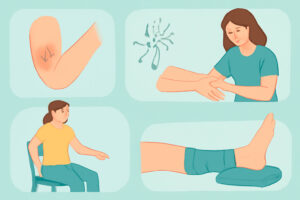Lymphedema is a chronic condition that arises from the disruption of the lymphatic system, often leading to swelling in the limbs. While the physical manifestations of lymphedema, such as swelling and discomfort, are widely recognized, the mental wellness implications are less understood. This article delves into the multifaceted impact of lymphedema on mental health, exploring the psychosocial ramifications, the challenges faced by patients, and potential interventions to enhance quality of life.
How Does Lymphedema Affect Mental Health Challenges?
What Are the Common Mental Health Challenges Associated with Lymphedema?
Individuals living with lymphedema frequently encounter a range of mental health challenges. The emotional toll can stem from both the physical limitations imposed by lymphedema and the societal perceptions surrounding visible disabilities. Patients with lymphedema often experience heightened levels of anxiety and stress, particularly when navigating social situations where their condition may be noticeable. The stigma associated with physical deformities can exacerbate feelings of isolation, leading to depressive symptoms. Furthermore, the unpredictability of lymphedema flare-ups can instill a sense of helplessness, significantly affecting the quality of life among patients.
How Does Lymphedema Contribute to Depressive Symptoms?
Research indicates a strong correlation between lymphedema and the development of depressive symptoms. The chronic nature of lymphedema, particularly in cases of cancer-related lymphedema, can lead to a pervasive sense of loss—loss of bodily autonomy, loss of social engagement, and in some instances, loss of employment. Breast cancer survivors with lymphedema, for instance, may grapple with feelings of inadequacy and sadness, stemming from their altered body image post-treatment. The struggle with body image is not limited to women; men and individuals with lower limb lymphedema also report similar emotional distress. The psychological burden of adjusting to a body that feels foreign can be overwhelming, leading to significant mental health challenges.
What Role Does Body Image Play in the Mental Wellness of Lymphedema Patients?
Body image plays a crucial role in the mental wellness of patients with lymphedema. The visible effects of the condition, such as swelling and changes in limb appearance, can lead to negative self-perception. For many, particularly women with breast cancer-related lymphedema, the changes to their bodies can trigger a profound identity crisis. These patients may feel disconnected from their pre-lymphedema selves, contributing to a decline in self-esteem and overall mental health. The association between body image and mental wellness is particularly significant in the context of social interactions; individuals may avoid public situations due to fear of judgment or scrutiny, further compounding their feelings of isolation and depression.
What Is the Psychosocial Impact of Living with Lymphedema?
How Does Lymphedema Influence Social Interactions?
Living with lymphedema can significantly influence social interactions. Many individuals with lymphedema report feeling self-conscious about their condition, leading them to withdraw from social engagements. The fear of being judged or misunderstood can create a barrier to forming and maintaining relationships. Moreover, the physical limitations associated with lymphedema, such as discomfort in movement or the need for frequent medical attention, can interfere with one’s ability to participate in social activities. This isolation can exacerbate feelings of loneliness and depression, creating a vicious cycle that impacts mental wellness.
What Are the Emotional Challenges Faced by Patients with Lymphedema?
The emotional challenges faced by patients with lymphedema are profound and varied. Feelings of frustration, sadness, and anxiety are common as patients navigate the complexities of their condition. For breast cancer survivors with lymphedema, the emotional challenges are often intertwined with their cancer journey, leading to heightened vulnerability. The unpredictability of lymphedema symptoms can evoke fear and anxiety about the future, impacting daily functioning and overall mental health. Furthermore, many individuals report difficulty in communicating their needs or experiences to family and friends, leading to a sense of alienation and emotional distress.
How Can Support Systems Improve Quality of Life for Lymphedema Patients?
A robust support system can play a crucial role in enhancing the quality of life for individuals with lymphedema. Emotional support from family, friends, and support groups can mitigate feelings of isolation and provide a sense of belonging. Engaging with others who understand the challenges of living with lymphedema can foster a sense of community and validation. Support systems can also encourage patients to seek professional help, whether through psychological therapies or counseling, which can address the emotional aspects of their condition. By fostering strong social connections, lymphedema patients can improve their mental wellness and overall quality of life.
How Does Cancer-Related Lymphedema Affect Quality of Life?
What Are the Unique Challenges Faced by Women with Breast Cancer-Related Lymphedema?
Women with breast cancer-related lymphedema face unique challenges that profoundly affect their quality of life. After undergoing breast cancer treatment, many women experience physical changes that can lead to a significant impact on their body image and self-esteem. The presence of lymphedema can add to the emotional burden, as these women grapple with the duality of being both cancer survivors and individuals with a chronic condition. The stigma associated with visible swelling can lead to social withdrawal and increased anxiety, further hindering their recovery journey. As a result, addressing the mental health aspects of breast cancer-related lymphedema is essential for improving overall health-related quality of life.
How Does Cancer Treatment Contribute to the Development of Lymphedema?
Cancer treatment can significantly contribute to the development of lymphedema, particularly in patients who undergo surgical interventions or radiation therapy. The disruption of the lymphatic system during these treatments can lead to secondary lymphedema, which often presents as swelling in the affected limb. Understanding the link between cancer treatment and lymphedema is crucial for healthcare providers, as it can guide early intervention strategies. Patients who are informed about the risk of developing lymphedema post-treatment can take proactive measures to manage their condition, potentially mitigating its psychological impact.
What Strategies Can Help Improve Health-Related Quality of Life in Cancer Survivors?
Improving health-related quality of life in cancer survivors with lymphedema involves a multifaceted approach. Education plays a vital role, as empowering patients with knowledge about their condition can foster a sense of control. Physical interventions, such as compression therapy and exercise, can alleviate physical symptoms while also promoting mental wellness. Additionally, engaging in psychological therapies can help address the emotional challenges associated with lymphedema. Support groups and community resources can provide essential emotional support, enabling cancer survivors to connect with others who share similar experiences. Together, these strategies create a holistic approach to enhancing quality of life in patients with lymphedema.
What Are the Diagnostic Challenges of Lymphedema?
How Is Lymphedema Diagnosed in Patients?
Diagnosing lymphedema can be a complex process, often involving a thorough clinical evaluation and patient history. Healthcare providers typically assess the swelling pattern, examine the patient’s medical history, and may employ imaging techniques to evaluate the lymphatic system. However, the lack of standardized diagnostic criteria can lead to delays in diagnosis, negatively impacting mental wellness. Early recognition and intervention are crucial for managing lymphedema effectively and can significantly improve quality of life among patients.
What Are the Common Misdiagnoses Related to Lymphedema?
Lymphedema is often misdiagnosed due to its similarities with other conditions that cause limb swelling, such as venous insufficiency or edema related to heart failure. This can lead to inappropriate treatment and prolonged suffering for patients with lymphedema. Misdiagnosis not only hampers effective management but can also exacerbate mental health issues. Patients who believe they are suffering from another condition may feel a sense of confusion or frustration when their symptoms persist. Understanding the common misdiagnoses related to lymphedema is essential for healthcare professionals to ensure accurate and timely treatment.
How Can Early Diagnosis Impact the Mental Wellness of Lymphedema Patients?
Early diagnosis of lymphedema can have a profound impact on the mental wellness of patients. Timely intervention can lead to better management of physical symptoms, reducing the psychological burden associated with the condition. Patients who receive an early diagnosis are often more likely to engage in preventive measures and treatment options, which can enhance their sense of agency and control over their health. This proactive approach can mitigate feelings of helplessness and anxiety, contributing to improved mental wellness and overall quality of life.
What Interventions Can Support Mental Wellness in Lymphedema Patients?
What Psychological Therapies Are Effective for Patients with Lymphedema?
Psychological therapies can play a significant role in supporting mental wellness among patients with lymphedema. Cognitive-behavioral therapy (CBT), for example, has shown effectiveness in addressing the emotional challenges associated with chronic conditions. By helping patients reframe negative thoughts and develop coping strategies, CBT can alleviate symptoms of anxiety and depression linked to lymphedema. Moreover, group therapy can provide a supportive environment for sharing experiences and fostering connections, further enhancing mental well-being.
How Can Physical Therapy Help Improve Mental Health in Lymphedema Patients?
Physical therapy not only addresses the physical aspects of lymphedema but can also have a positive impact on mental health. Engaging in tailored exercise programs can improve physical function, reduce swelling, and enhance body image, all of which contribute to better mental wellness. The act of participating in physical activity can also release endorphins, promoting feelings of happiness and well-being. For individuals with lower limb lymphedema, physical therapy can provide the tools necessary to manage their condition while fostering a sense of accomplishment and empowerment.
What Lifestyle Changes Can Enhance Quality of Life and Mental Wellness?
Making lifestyle changes can significantly enhance the quality of life and mental wellness for individuals with lymphedema. Regular exercise, a balanced diet, and stress management techniques such as mindfulness or meditation can all contribute to improved mental health. Additionally, fostering social connections and seeking support can alleviate feelings of isolation. By adopting a proactive approach to their health, patients with lymphedema can take charge of their well-being, leading to a more fulfilling and enriched life.





